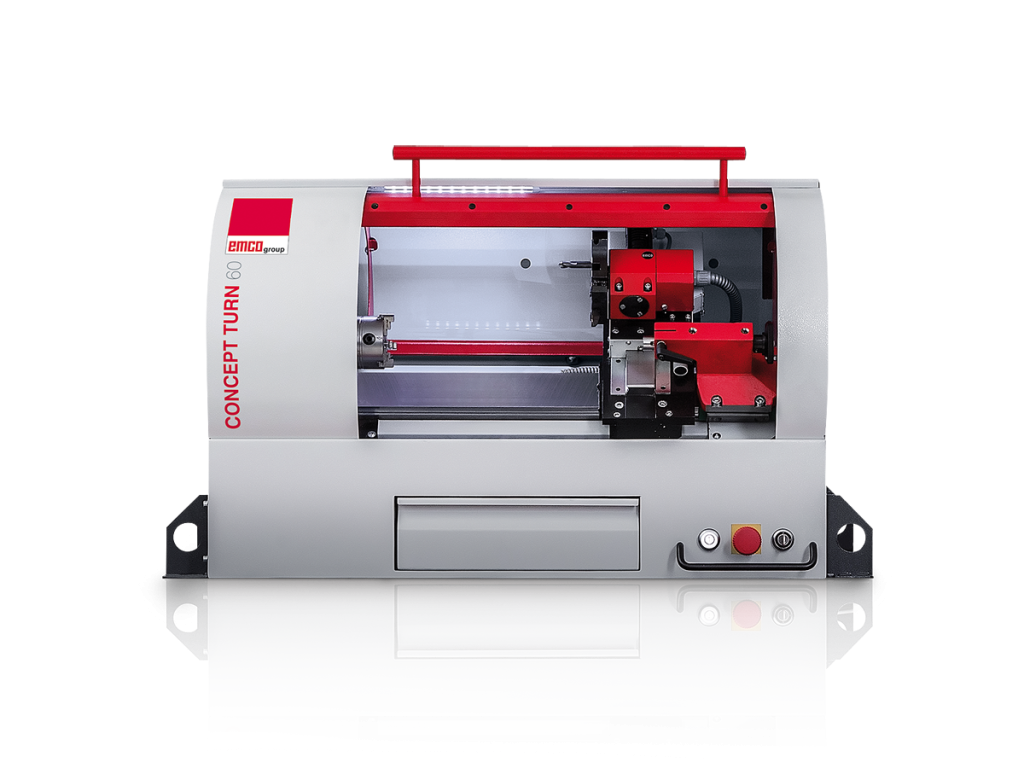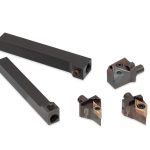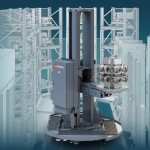Concept TURN 60 CNC Turning Machine
Concept TURN 60 CNC Turning Machine
EMCO Maier Corp. says its Concept TURN 60 is a high-performance PC-controlled 2-axis CNC turning machine that fully meets industrial standards in terms of construction and is a powerful machine for industrial training. With the intensifying competition and ever increasing requirements for quality, productivity and flexibility, demands for well-qualified employees also continue to grow. This is where training plays its part: EMCO Industrial Training is a modular training concept to prepare employees for the specific production requirements and provide them with targeted training.

EMCO Maier Corp. says its Concept TURN 60 is a high-performance PC-controlled 2-axis CNC turning machine that fully meets industrial standards in terms of construction and is a powerful machine for industrial training. With the intensifying competition and ever increasing requirements for quality, productivity and flexibility, demands for well-qualified employees also continue to grow. This is where training plays its part: EMCO Industrial Training is a modular training concept to prepare employees for the specific production requirements and provide them with targeted training. EMCO has developed and provides a range of training CNC machine tools, including turning centers and machining centers plus courseware.
The machine base of the CT 60 has been newly designed to provide state-of-the-art training for modern industrial machining: thanks to its inclined-bed design and the use of modern profile rail guides, the CT 60 offers high levels of rigidity and robustness.
The positioning of the tool turret above the center of rotation is also based on industrial machines. The machine's operation with, for example, an enabling switch and operating mode selection switch, demonstrates its industry-oriented design, and all this is based on the current turning machine standard ISO 23125.
Training can be provided on all industry controls that are common on the market, thanks to the concept of interchangeable control. The conversion to another control system is carried out within a minute by calling up the respective software and by simply replacing the controller specific module. Up to eight different control systems can be installed and taught on one single machine. Of course, EMCO is also constantly working on new WinNC control units, so that Concept machines can continue to be upgraded with the latest CNCs.
Easy2Control is a software option that offers control-specific keys for the WinNC controls on a 16:9 Full HD screen, including with touch functionality. It is not necessary to manually switch panels anymore with this option because the responding panels are shown on the screen when opening the specific control software.
The various control panels for control and fast access can be switched between via tabs. The control panel for the machine is designed in the form of a mini hardware operating console called "Easy2operate."
As an alternative, the machines can also be controlled directly, without an external PC. The easy to use software EASY CYCLE is EMCO's own software and it is based on cycle programming. The software can be downloaded for free from EMCO's homepage.
In addition, the EMCO Win3D-View, which offers 3D simulation, far exceeds the standards of training and even the industry standard. This realistic simulation of the machining processes and machine periphery is ideal for training purposes, allowing the trainee to see the manufacturing processes directly on the screen. This shows once again the great deal of importance that EMCO places on training and its vast experience in this area.
Online platform for CNC knowledge transfer: With its new virtual learning environment, EMCO is offering an innovative tool for industrial training and education. The E[MCO] CAMPUS includes over 700 learning maps, videos, interactive achievement tests, explanatory texts, and images, and also allows tutors to create individual curricula and dedicated content using an authoring tool. Trainees work through four courses.
Machining Technology, CNC and Quality in a relaxed learning environment. All courses have been designed in accordance with professional educational principles and make use of the most appropriate media. Whether a newcomer, machine operator/setter, or machining technician, the course contents are designed to match the individual student's level of knowledge. Tests at regular intervals provide students with the necessary feedback on what they have learned at each stage.
E-learning and classroom teaching for sharing machining technology expertise: The EMCO CAMPUS is the ideal way to promote classroom teaching, as the basic principles can be learnt anywhere and at any time, and the learner can then come to the classroom as prepared as possible for further learning.
The demands for technical education and training continue to grow: currently knowledge of 5-axis technologies and counter spindle applications is increasingly expected by the industry and these areas are therefore taught. So that the classroom teaching sessions can be used for learning new technologies and content, the theoretical basis should be learnt beforehand, and the EMCO CAMPUS supports the learners in this. Self-monitoring skills are also promoted: the learners are encouraged to adapt their learning phases to their individual needs and continuously monitor whether their learning objectives have been met.
Typical Concept TURN 60 users are industrial training establishments that also manufacture goods, manufacturing companies with apprentices and trainees, factories, watchmakers and jewelry manufacturers, as well as beginners with demanding requirements and motivated CNC technicians who would like further training.





